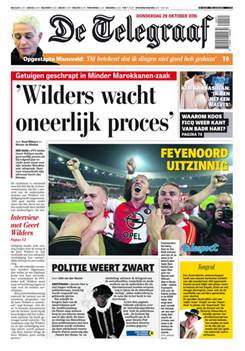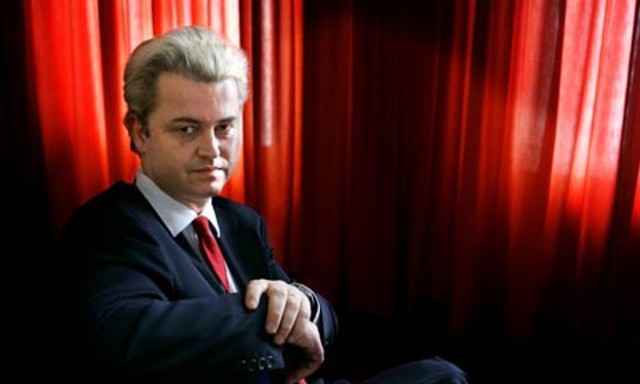Lawfare: The Crucifixion of Geert Wilders
Geert Wilders has, once again, been accused, of violating hate laws in The Netherlands over a remark he made during a March 19, 2014 Freedom Party (PVV) campaign rally for the European Parliament elections that occurred in May of last year: “fewer and fewer Moroccans”. Complaints were filed by alleged aggrieved Dutch Moroccans on the grounds that his remarks were racist and violated hate laws in The Netherlands. These remarks in the U.S. would be protected under our First Amendment to the Constitution. No such protections currently exist under the laws in The Netherlands, let alone the EU. We noted this in a December 2014 Iconoclast post about a statement Wilders made before his interrogation by Dutch police in The Hague:
The words Orwellian, Kafkaesque appear inadequate to describe the trammeling of the Hon. Geert Wilders’ free speech by Dutch prosecutors at the Hague in The Netherlands. We write this with the imagery of the fictional victim of Kafka’s posthumously published novel, The Trial. Joseph K was arrested by police inspectors for unknown reasons and every word of his scrutinized before his climactic death.
What Wilders is going through is not fiction, but a living nightmare. All because he spoke his mind during a local elections Freedom Party (PVV) campaign rally last spring about “fewer Moroccans”. That was a reference to his platform of controlling mass immigration of Muslims who have exhibited substantial criminal behavior incited by Islamic doctrine and preaching by Imams in Dutch Mosques.
We thought his exoneration in the May 2011 Amsterdam District Court trial on alleged hate speech law violations would end his nightmare of prosecution for what we in the US take for granted as protected speech under the First Amendment of our Constitution.
Public Prosecutors in The Hague are preparing for a trial on these trumped up charges in 2016. Wilders was exonerated from similar charges in a well publicized 2011 trial in the Amsterdam district court. Wilders’ has retained one of the best known defense attorneys Geert-Jan Knoops. However, the trial judge remarks and denial of what we in US trial procedure would consider customary discovery requests would lead one to believe that The Hague court proceedings on these charges are politicized and biased this bolstering of both Knoops and his client Wilders that a fair trial would not be possible. Those are the contention of this front page interview with Wilders and his defense counsel, Knoops in this De Telegraaf article by Messrs. Wouter de Winther and Rudd Mikkers. Wilders says, if that is the case then why show up at the trial, as the decision has already been made and the prosecution would be a proverbial media circus.
What follows is an English translation of the De Telegraaf interview article,”Wilders awaits unfair trial”.
 Wilders awaits unfair trial
Wilders awaits unfair trial
by Wouter de Winther and Ruud Mikkers
The Hague
PVV leader Geert Wilders awaits an unfair trial if he stands trial next year for stating that he wants “fewer Moroccans”. That is what his lawyer Geert-Jan Knoops says.
The lawyer is upset about the fact that the judge has allocated only 1 percent of the investigation requests of Wilders’ defense. “These include doing further research by experts. The defense has serious concerns about whether Mr. Wilders in his criminal case can adequately defend himself,” Knoops says in a statement. “When all reasonable requests are rejected, they apparently want to convict me at all costs,” the PVV leader concludes. Wilders is expected to appear in court sometime in 2016. “A correct picture of the context of the alleged statements of Mr. Wilders is essential,” says Knoops. “In order to present this picture to the judge, Wilders should get the chance that he gets the investigation he has asked for.” The lawyer says that Wilders is seriously harmed in his defense. “This way, Mr. Wilders does not get a fair trial.”
PVV leader Wilders feels provoked. He says he will not get a fair chance to defend himself in the trial in which he is being sued for group insult and incitement to hatred and discrimination. Almost all his requests to hear experts or to examine whether there has been tampered with declarations against him have been dismissed. He has appealed, because this way the chance of a fair trial would be reduced to nil.
What are the indications that suggest that you will not get a fair chance at a defense? “I notice that the judicial authorities get more intransigent as we rise in the polls. At the first meetings, the magistrate still said to me, ‘You are entitled to a fair chance; the law will be interpreted broadly. But the opposite has happened. The magistrate uncritically follows the prosecutor. If all reasonable requests are rejected, then they apparently want to convict me at all costs.”
Why would Lady Justice suddenly take off her blindfold for Geert Wilders? “For months, we have been working on the defense and therefore you suggest that further investigations be conducted. For example, what about government ministers who already declared me guilty before the trial had begun, such as [Justice Minister] Opstelten? And we also want to know what has happened with all the pre-printed complaint forms. We have discovered that various forms have same signatures on them! We also want to hear experts, for example about the accusations of racism. A nationality is not a race, so how can I be guilty of racism? I am convinced that if today I ask “Do you want more or fewer Syrians,” no one would take offense at that, let alone that there would be complaints would be filled.”
But then we are dealing with refugees without a residence permit. Not Dutch citizens who have already been here for thirty or forty years. “Yes, but I’m talking about the concept of nationality versus race. That is what everyone objected to, while I think that would now no longer be the case. If I would ask, ‘Do you want more or fewer Belgians; I do not believe that many people would feel offended. I want to hear the opinion of experts about this. I want to defend myself, but I must also be able to defend myself. The frustrating thing is that we have made 39 requests and zero have been granted. One of them has been kept in deliberation.”
During your previous trial, you had you done serious and less serious requests, you asked to hear Gaddafi or invite the Iranian president as a witness. What requests did you do this time? “I have noticed that the director of a mosque filed several complaints with different handwritings but the same signature. Hundreds of complaints were done on forms delivered in that mosque. About such matters I would want to hear the opinion of experts, because this cannot be allowed. I cannot give you all the names, because that information is not public. For example, Tom Zwart, professor at the University of Amsterdam, and Professor Paul Cliteur were willing to testify. But they have been rejected. “
What is behind all this? I do not know. However, I have seen on television there are people in the judiciary who say that PVV members cannot become judges. In the newspaper I read that the Public Prosecutor had already appointed two media judges even before the decision to prosecute had been taken. And as we rise in the polls, the rejections from the judicial authorities become more blunt and unfriendly. If this continues, then it seems as if the verdict has already been written. Then I will have to consider whether I need to attend. Perhaps they should just rule in absentia. For me, it makes little sense to come. If this persists, it will be a political trial and a PVV-hate trial.”
Are you saying that the judiciary in the Netherlands is not independent? “I want to talk about my case. If this persists, it will not be a fair trial. Obviously, I am also referring to the statement by the judge who said that PVV members should not be allowed to become judges. That is the atmosphere in which this is all happening.”
You are again seeking the role of the underdog, you and the PVV fighting the established order on your own. Is that not becoming a bit déjà-vu? “I would rather not have been prosecuted, because I think I’ve done nothing wrong. I do not seek the role of the victim here because I would rather have preferred that I could defend myself. But if all requests are rejected, then it is no use. Let them then quickly sentence me in absentia. I hope it does not come to that. Because it will be a circus.”
What consequences will a conviction have for you? “I will always continue to say what I have to say. However, with the difference that I would only be able to express certain messages in the microphone of parliament. Because there I have immunity. If freedom of expression is curtailed, I can no longer express certain opinions anywhere.”
Virtually nowhere you get what you want. But when you do think your trial will actually be fair? “That depends on which requests are granted and in what way. Knoops also needs to have the impression that he can truly defend me. If such a person, the best criminal lawyer in the Netherlands says it is not fair … that’s quite something. Knoops is not someone whom you can abuse politically.”
Given all the hassle afterwards, don’t you regret having made the statements about “fewer Moroccans”? “I think an excuse to make it harder for the PVV will always be found. We are under more scrutiny than politicians of D66 or the Green Left because we are very outspoken. I understand that. We also oppose the establishment and do not mince our words. If you do that you do not make it easy for yourself.”
Ultimately, this trial is about the freedom of expression. You always draw the line very clearly at calling to violence, but should everything else be said? “I think you should be able to say if you want fewer Mexicans or Syrians. That is not discriminatory and certainly no call to violence. I will always continue. Nothing will stop me to express my opinion. Not a hundred judges, not a thousand verdicts or fatwas will be able to change that.”
Can you imagine that Moroccan Dutch people feel excluded by such a fewer Moroccans statement? “I do not really care what they feel or don’t feel. The point is whether it is illegal or not and I do not think that I have done anything wrong. If people feel hurt they should address a psychologist or someone similar.”
Today or tomorrow you would as easily say “fewer, fewer, fewer Syrians”? “I’m not saying I will do that, but if I would, it would in my opinion no longer cause a lot of commotion.”
Yet you do not say it so explicitly today. Has this reluctance to do with the
upcoming trial? “We are calling for fewer Syrians that is absolutely true. But today or tomorrow, I will not be holding such a speech as last year. But if I would, and if I would say it… then I think that nothing would happen. In America, any politician can advocate fewer Mexicans. No-one would object.”
EDITORS NOTE: This column originally appeared in the New English Review.

